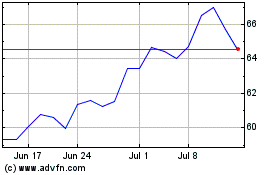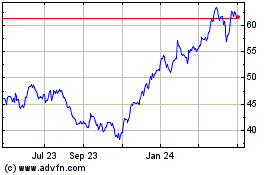By AnnaMaria Andriotis
Teri Carter Beahm was out of work and nearly out of money when
she called Citigroup Inc. on March 30, two days before a $64
credit-card payment was due.
The private-events bartender got nowhere with the bank's chat
bot. She messaged the bank asking if a refund for an item she had
returned could substitute for the payment. When she called, an
automated message said to try again later.
"Is someone going to answer my question before tomorrow when my
payment is due?" she wrote in a follow-up message. She didn't get
an answer.
Millions of Americans have asked for a break on their debt
payments to weather the coronavirus shutdown. Their lenders are
having a hard time keeping up.
Borrowers seeking debt relief are encountering jammed phone
lines, overflowing inboxes and stretched-thin customer-service
departments. Multiple calls to the same lender can yield different
answers on the relief programs borrowers qualify for. Sometimes it
is taking lenders weeks to reflect the changes on borrowers'
accounts.
And there is no set menu of relief options for many consumer
debts; lenders vary widely in how much relief they are offering and
for how long. Lenders are declining to defer payments for some
borrowers who were behind on their payments before the coronavirus
laid waste to the U.S. economy. Some who have been given deferments
are getting alerts that their payments are past due anyway.
Lenders "are pretty overwhelmed by the amount of calls and
questions they're getting," said Leslie Parrish, a senior analyst
who covers consumer lending at Aite Group, a research and
consulting firm.
These days, Ms. Beahm spends much of her time on the phone with
creditors. She was able to keep up with her roughly $1,600 a month
in minimum payments on 10 credit cards, a car lease and three
personal loans until the pandemic put a stop to the weddings and
private parties she worked.
Ms. Beahm sent Citigroup six messages between March 30 and April
9. A few days after she missed her credit-card payment, she was
charged a $28 late fee and $42 in interest.
In mid-April, Citigroup sent Ms. Beahm a letter and a digital
message saying that her late fee was waived and her payments would
be put on hold. But about a week later, she got an email saying she
was late. On May 1, she dipped into her small emergency fund to
make the $64 payment after she called the bank and heard an
automated message that confused her.
A spokeswoman said the bank waived Ms. Beahm's late fee for
April and deferred her payments for May and June. "While Ms.
Beahm's request was addressed last month, we sincerely regret the
delay in handling it. It's not representative of the experience we
strive to provide," she said.
The bank, she said, has seen a "significant response from
customers who are experiencing financial hardship" and has helped
more than 1.3 million individuals and small businesses by deferring
payments and waiving fees "in a matter of weeks."
Americans were carrying record levels of debt before the
pandemic hit, and a lack of access to relief options threatens to
increase that burden. Late fees and interest payments could plunge
struggling borrowers deeper into debt. Missed payments and rising
balances could drag down credit scores, putting affordable credit
out of reach when it is most needed.
Steven Sickinger dialed Discover Financial Services three times
in recent weeks to ask for a break on his credit-card bill. He is
earning a third of his pre-pandemic pay as a manager at an
auto-repair shop in Tucson, Ariz., because of the decline in
customers.
Mr. Sickinger said that a Discover customer-service
representative told him he could defer payments on the card, which
has a balance of about $2,000, but would have to make a lump-sum
payment when he starts paying again.
"I said, 'How am I supposed to make a lump-sum payment when I
can't afford the one that is due now?'" Mr. Sickinger said. He said
his request to speak with a supervisor was turned down.
A Discover spokesman declined to comment on Mr. Sickinger's
situation but said the company is offering deferments and other
relief to customers in need. "We handle every case on an individual
basis," he said.
In some cases, customer-service agents inundated with calls and
unfamiliar with their banks' relief programs have given borrowers
inaccurate information.
Ron Harris called U.S. Bancorp in March to ask about delaying
his credit-card payment after the coronavirus shutdown put his two
sons, who live with him, out of work.
The 51-year-old teaching assistant said a customer-service
representative told him his $400 payment would be put on hold for
April.
When he later called to inquire about a missed-payment notice,
he was told he was ineligible for a deferral. The representative
encouraged him to make a payment and said the bank would try to
waive some interest charges in exchange.
"If I could make a payment, I wouldn't be asking for a
deferral," Mr. Harris said. He borrowed money from extended family
members to cover the bill.
U.S. Bank said that the employee who said Mr. Harris could skip
the April payment made a mistake and that the bank has since
deferred his payments for May and June and refunded him a late fee
and interest charges.
"We have coached that agent and are reviewing additional call
recordings during that time to ensure there are no other such
errors," she said.
Technical glitches have also caused problems.
Diana Rodriguez spent much of March sick with Covid-19, the
illness caused by the coronavirus, and worried it would put her out
of work. She also spent hours on the phone trying to get through to
her creditors.
The software engineer called Santander Consumer USA Holdings
Inc., seeking a break on a loan for a new Toyota RAV4 she bought
last summer. A representative said the lender would email her the
necessary paperwork to put her $736 monthly payment on hold.
Ms. Rodriguez never got the email, but she did receive a
late-payment notice. When she called back, she waited on hold for 2
1/2 hours before reaching a supervisor, who said Santander was
having technical difficulties with the deferment forms.
Santander received more than a million calls in March from
customers requesting help and has given more than 350,000 customers
extensions, hardship modifications or fee waivers, a spokeswoman
said.
"We are proud of the work we have done to help customers stay in
their vehicles and manage their payments," she said.
Write to AnnaMaria Andriotis at annamaria.andriotis@wsj.com
(END) Dow Jones Newswires
May 13, 2020 05:44 ET (09:44 GMT)
Copyright (c) 2020 Dow Jones & Company, Inc.
Citigroup (NYSE:C)
Historical Stock Chart
From Mar 2024 to Apr 2024

Citigroup (NYSE:C)
Historical Stock Chart
From Apr 2023 to Apr 2024
